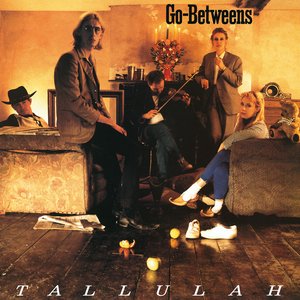Published on Apr 4, 1998
My roommate is obsessed with what I call “Bedtime Rock.” That
is, she obsessively listens to Enya and Enigma while studying yet
manages to stay awake and actually get things done in the process.
Any type of rock that slows your heartbeat to that of a hibernating
bear draws her in; thus, it was no shock to me that when I popped
this album in the CD player, she reacted much like she does when
forced to listen to Dream Theater – she ran out of the room
hollering “Ewww!”
I feel that
Tallulah doesn’t fly with her due to its pure and
unadulterated rawness. Much like Paul Westerberg, singer Robert
Forster doesn’t mind rubbing your ears raw with his vocal style and
somewhat repetitive lyrics. Of course, this repetition is something
that makes pop songs work, and The Go-Betweens almost deliver the
perfect “Make me famous!” formula throughout the album — verse,
chorus, verse, middle 8, chorus…. etc., etc., dull, dull,
dull.
This standard song construction isn’t something that necessarily
bugs me, though. When it comes down to it, what I want to hear is a
nice hook, some cool and intelligent lyrics, and a great musical
composition. This album is pretty smart in all of the above ways.
Unfortunately, many of the moments of genius on this album are
quickly slapped down due to the intense mediocrity of the songs
that follow. The catchy “Right Here”, which is cutesy at it’s core
yet enjoyable in that two-minute pop song fashion, is countered by
the entirely too weird and out of place “The House That Jack
Kerouac Built”. The pure lyrical genius of “Bye Bye Pride” is
forgotten once listening to the lame lyrics of “You Tell Me”. I
don’t like listening to stupid end-rhymes, and while the great
songs are completely and magically void of them, songs like “You
Tel Me” wallow in them! Example:
“Tallulah took a shower for an hour, [ed: bad and cheesy
rhyme]
Then she walked down the street feeling beautiful and clean”
[ed: what the hell is this?!]
I want to fly over to the UK and drag writer Forster and his
cohort, Grant McLennan, out to a high school poetry class to teach
them the evil of cliches and rhymes like this.
The odd thing about these less-than-wonderful songs, though, is
the fact that they grow on you. Even though I hated the “Jack
Kerouac” song initially, I found that I was oddly drawn to the
darkness and eeriness that marked the song. What didn’t make for
great radio play actually somewhat accurately reflected the
historical circumstances around Kerouac’s life. It speaks of the
extreme loneliness Kerouac felt, and even ends with the line
“You’re on the road.” (You know, like the book.)
“Someone Else’s Wife”, which I thought was annoying due to the
horrid lyrical content of the chorus, grew on me because I almost
thought it was funny:
“Don’t say you’ve got a home and new life;
I won’t stand in your way ’cause you’re someone else’s
wife.”
NO, really! These lyrics say things that are overly obvious to
the standard human being. I don’t know a lot of people who are into
annoying married women. (This could be due to my age, but oh
well…) It seems hilarious to hear someone actually say this
to another person – it is much like reading a love letter from an
obsessed weirdo who is in denial. You can’t help but think, “Ha ha
ha! You are a loser!”
My favorite song on the album would have to be “Bye Bye Pride.”
When I originally heard the song, it was as a cover done by Del
Amitri. I was so intrigued by it that I searched out the original
artists, which led me to this album. Every part of the original is
amazing – the use of the oboe, the harmonizing on the chorus, and
most spectacularly, the lyrics. The imagery this song provides is
amazing! Mostly, the song is about finding personal freedom in a
world that tends to demoralize and trap people – it is one of those
uplifting (but not “gospel-esque”) songs one could listen to when
they felt that the world was against them, yet is entirely devoid
of cheesiness. An example:
“The white moon appears like a hole in the sky
The mangroves grow quiet
In la Brisa de la Palma
A teenage Rasputin takes the sting from a gin
‘When a woman learns to walk she’s not dependent anymore’
A line from a letter, May 24
And out on the bay the current is strong
A boat can go lost”
I think this is absolutely fabulous!
This album marked the addition of what I feel is one of the
group’s greatest assets – Amanda Brown, the violinist/oboe player.
The two instruments fill out each song nicely, especially “Right
Here”, which was released as a single. Fans of the ’80s are not
going to be overly excited by this album, because while it has its
catchy moments, it doesn’t offer the pop excitement of songs from
the same period, like “Take on Me” or “Rio.” Somewhat like Prefab
Sprout, the depth of the great tracks alienated the album from the
popular market, and the mediocrity of the other songs destined the
album to a short radio life.
